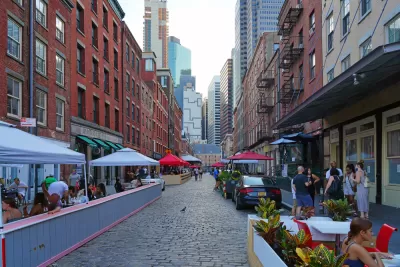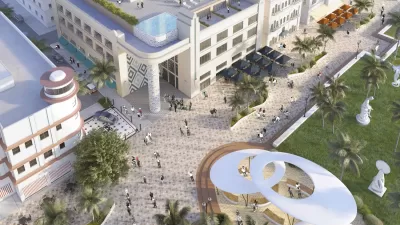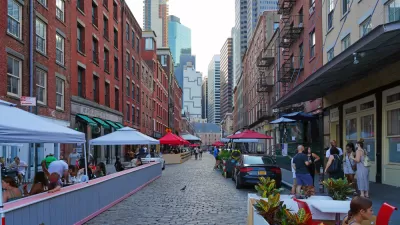The effort to reclaim public and private spaces from car storage had some setbacks since the days of al fresco and open streets in the first years of Covid-19. But widespread parking reforms and new evidence shows the public is rethinking parking.

The empty streets and suffering business that defined the early months of the Covid-19 pandemic also prompted a fresh look at the public realm, inspiring many cities and communities to reclaim and transform some of the spaces previously reserved for automobile storage into spaces for other activities, such as play, dining, and exercise.
The programs that recovered parking spaces for more active, human uses retreated, to a degree, in the ensuing months and years: while some cities have made outdoor dining programs and parklets permanent, others have reopened streets to cars, rescinded permitting programs, and dialed back ambitions for a post-parking future.
Oliver Moore, writing for the Globe and Mail, makes the case that despite these setbacks for the cause, "the broader pattern is a gradual dismantling of the decades-long assumption that more parking is inherently better." Moore points to the parking reforms underway in Canadian cities, first in Edmonton, followed by more than a dozen other cities as support for the argument (the parking reform trend is also obvious in the United States).
"Perhaps the biggest recent shift in attitudes around parking has been the recognition of just how much value may be forgone by using desirable urban real estate as car storage," writes Moore. A recent report assigns financial value to the choice between parking or other uses of urban space.
Researchers for an association of local business improvement areas estimated that customers spent $181-million in the repurposed parking spaces in the summer of 2021. The same spaces would have generated $3.7-million in parking revenue, according to the local parking authority, and even that modest figure assumed prepandemic levels of demand.
Moore's conclusion, with more examples and and appeals to authority, included in the source article (which requires an email to read for free): people are slowly waking up to the idea that parking doesn't play the same role in cities as it did in the 1950s.
FULL STORY: New spin on parking spaces during pandemic reaps benefits

Maui's Vacation Rental Debate Turns Ugly
Verbal attacks, misinformation campaigns and fistfights plague a high-stakes debate to convert thousands of vacation rentals into long-term housing.

Planetizen Federal Action Tracker
A weekly monitor of how Trump’s orders and actions are impacting planners and planning in America.

In Urban Planning, AI Prompting Could be the New Design Thinking
Creativity has long been key to great urban design. What if we see AI as our new creative partner?

King County Supportive Housing Program Offers Hope for Unhoused Residents
The county is taking a ‘Housing First’ approach that prioritizes getting people into housing, then offering wraparound supportive services.

Researchers Use AI to Get Clearer Picture of US Housing
Analysts are using artificial intelligence to supercharge their research by allowing them to comb through data faster. Though these AI tools can be error prone, they save time and housing researchers are optimistic about the future.

Making Shared Micromobility More Inclusive
Cities and shared mobility system operators can do more to include people with disabilities in planning and operations, per a new report.
Urban Design for Planners 1: Software Tools
This six-course series explores essential urban design concepts using open source software and equips planners with the tools they need to participate fully in the urban design process.
Planning for Universal Design
Learn the tools for implementing Universal Design in planning regulations.
planning NEXT
Appalachian Highlands Housing Partners
Mpact (founded as Rail~Volution)
City of Camden Redevelopment Agency
City of Astoria
City of Portland
City of Laramie





























